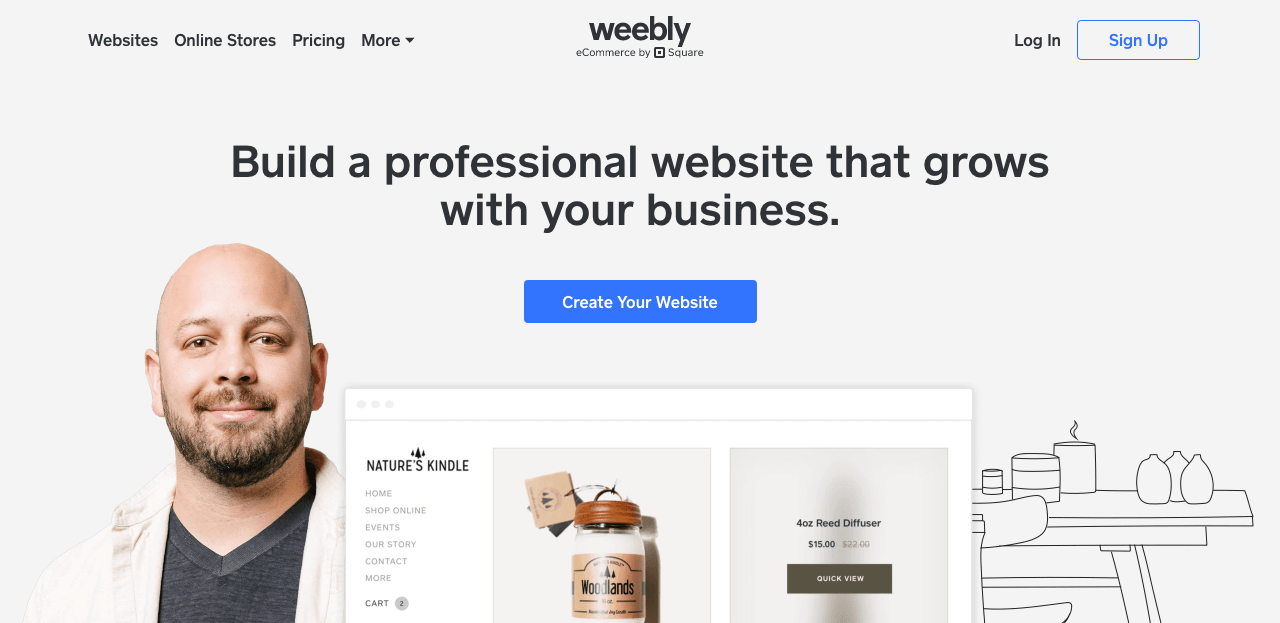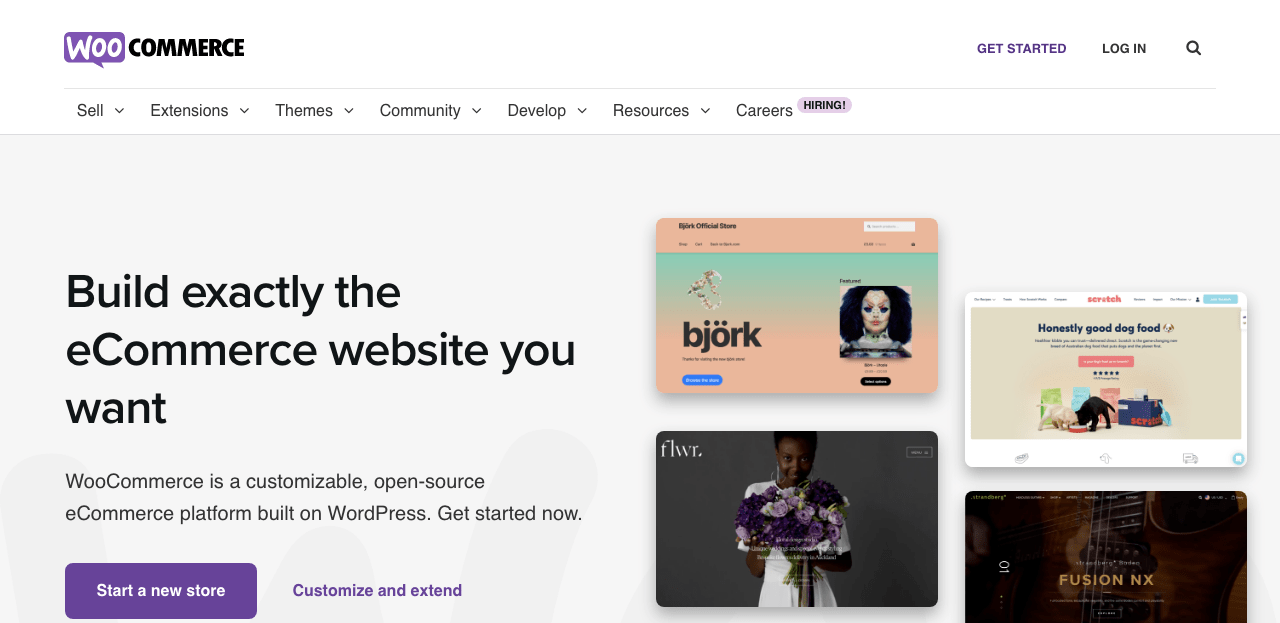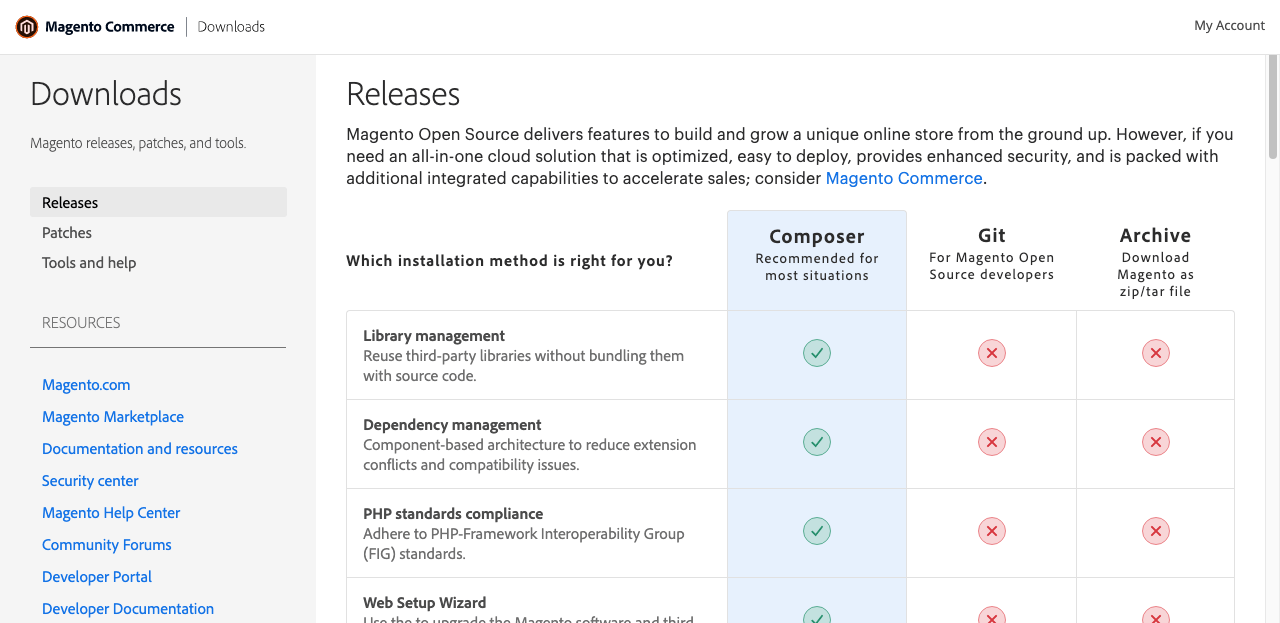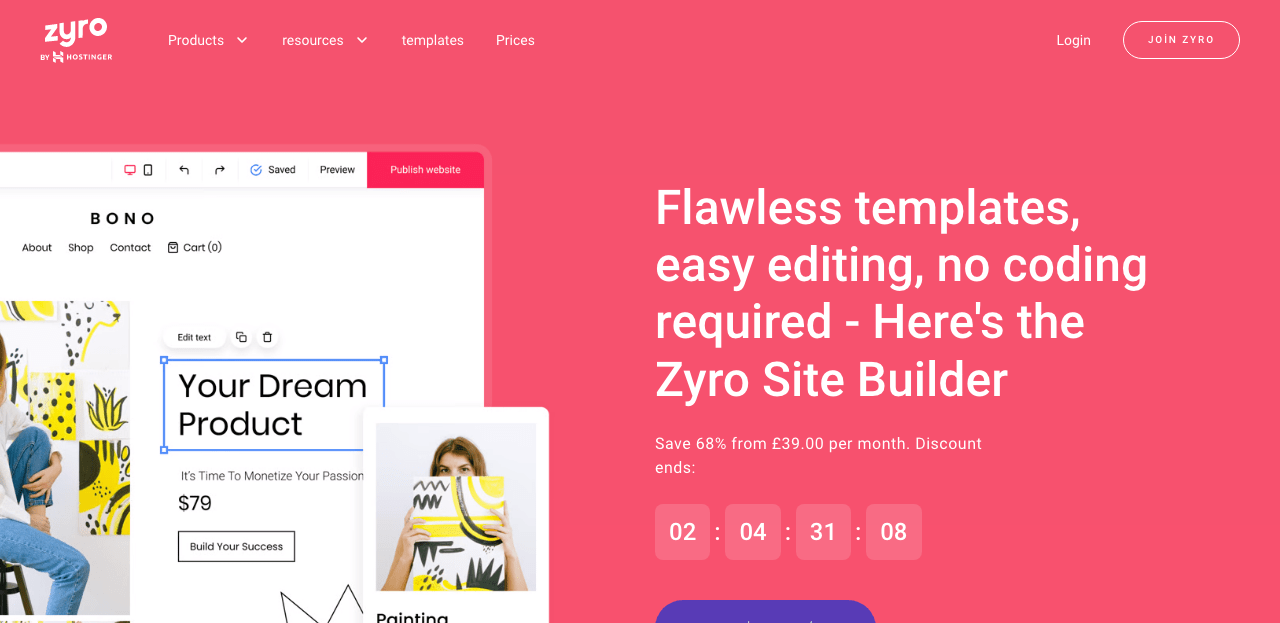Searching for Shopify competitors? Do you feel Shopify isn’t cutting it for your eCommerce business? Don’t worry; you’re not alone!
While Shopify is a fantastic eCommerce platform, it’s not the be-all and end-all of eCommerce. Plenty of other great options might be a better fit for your business.
This article will dive into nine of the best Shopify alternatives, comparing features, pricing, ease of use, and more. Whether you need more customization options, a cheaper option, or just want to try something new, there’s sure to be a Shopify competitor that fits the bill.
From Wix and WooCommerce to Weebly and Bigcommerce, we’ll discuss each platform’s pros and cons so you can make an informed decision about which one is right for your business.
Get ready to say goodbye to Shopify and hello to a whole new world of eCommerce possibilities.
What are the best Shopify Competitors?
Here are our top picks of the best Shopify alternatives and alternatives you should consider using for your eCommerce stores.
1. Bigcommerce.
Best Shopify Alternative for Small and Medium Businesses.

If you’re on the hunt for an eCommerce platform that offers all the essential features of Shopify and then flexible, BigCommerce might be just what you’re looking for.
This leading SaaS eCommerce platform is packed with customization options, powerful API functions, and an omnichannel management system that allows businesses to sell on multiple channels like Amazon, eBay, Facebook, and Instagram.
But wait, there’s more! BigCommerce also has high availability (HA) infrastructure, ensuring your store is always up and running.
And with the BigCommerce API exposing 90% of the platform’s data, developers have plenty of flexibility when customizing their stores. Plus, BigCommerce’s server-to-server API functions enable headless commerce on WordPress and beyond, giving you even more options when it comes to content management.
Overall, if you’re looking for a Shopify alternative that offers a ton of customization options and the ability to sell on multiple channels, BigCommerce is worth considering.
Key features of Bigcommerce:
- With Bigcommerce’s product management tools, you can easily manage your listings and sales data and showcase your products professionally with features like the product catalog and listing tool.
- Sell digital products like eBooks, music, and software with Bigcommerce’s subscriptions and downloads feature.
- The customer service tools make managing inquiries and support requests easy, while the product variation feature allows you to offer different versions of the same product.
- Get creative and give your store a unique look with Bigcommerce’s visual customization features.
- Don’t let abandoned carts bring you down! Use Bigcommerce’s abandoned cart recovery tool to automatically send targeted emails to customers who have left items in their cart.
- Payment integration is a breeze with Bigcommerce, which easily integrates with popular gateways like PayPal and Stripe.
Pros:
- Sell B2B and B2C products and services.
- All your store’s data is stored on secure servers.
- Wide variety of professionally designed templates.
- Provides add-ons for order processing, payments, and shipping.
Cons:
- Some features require additional fees.
- Third-party app integrations can be pricey.
Bigcommerce Pricing:
Bigcommerce offers four main plans, namely:
- Standard: $29.95 per month.
- Plus: $79.95 per month.
- Pro: $299.95 per month.
- Custom pricing: Get a quote.
Related article: 7 Best Bigcommerce Competitors and Alternatives
2. Wix.
Best Shopify Alternative for Startups.

Wix is a cloud-based web development platform that allows anyone to create and manage a beautiful website and eCommerce store. It offers the tools to design and customize your site to reflect your brand and meet your business needs perfectly.
But what about mobile optimization, you ask? While Wix may not offer the same level of mobile optimization as Shopify, but it is still a very mobile-friendly platform.
Nearly all the templates offered by Wix are designed to be responsive, meaning they will automatically adjust to fit the screen size of the device they are being viewed on. So, whether your visitors are using a phone, tablet, or computer, your website will look great.
Wix also offers a wide range of page templates to choose from, giving you even more control over the look and feel of your store. And if you’re planning on selling products, Wix has you covered with its built-in eCommerce store.
Overall, Wix is a flexible, user-friendly alternative to Shopify that won’t break the bank.
Key Features of Wix:
- Get control over the appearance and identity of your site with a custom domain name and boost your search engine optimization with Wix’s SEO tools.
- The intuitive drag-and-drop editor makes it easy to create a unique layout and personalize your site.
- Wix’s built-in CMS allows you to easily manage your website’s content, including adding, editing, or deleting pages and creating blog posts directly on your site.
- Keep track of your website’s visitors and customers with integrations for your email account.
- Choose from over 500 templates to find your site’s perfect look and feel.
- Don’t worry about being left in the lurch – Wix provides 24/7 customer support.
- With Wix’s scroll effects, you can add animation and interactivity to your site, making it more engaging and fun for your visitors.
Pros:
- Easy to create an online store drag and drop website builder.
- Set up is easy using the Wix setup wizard.
- Access to thousands of high-quality stock images.
- Wix provides dedicated hosting for your store
- Offers 24/7 customer support
Cons:
- Limited eCommerce features compared to Shopify.
- Some templates are more customizable than others.
Wix Pricing:
Wix is a relatively affordable option, starting at $23 per month, compared to Shopify at $29 per month. This e-commerce platform offers four main eCommerce pricing plans, namely:
- Business Basic: $23 per month
- Business Unlimited: $27 per month
- Business VIP: $49 per month
- Enterprise: $500 per month
Related article: Best Wix Alternatives And Competitors
3. Weebly.
Best Shopify Alternative for Beginners.

Are you on a budget but still want a top-notch eCommerce platform? Look no further than Weebly, the content management system and website builder that offers blogging and eCommerce features at an affordable price.
Whether you’re a tech pro or a complete beginner, Weebly makes it easy for anyone to create high-quality sites easily. And with its growing popularity as a viable eCommerce platform, Weebly is quickly becoming a go to choice for those looking for an affordable and user-friendly alternative to Shopify.
Like Shopify, Weebly allows you to customize your websites with various themes and plugins. But what sets Weebly apart from Shopify is its cost-effective pricing, which makes it an appealing option for businesses on a budget.
Of course, everyone has their preferences, so it’s up to you to decide whether Weebly or Shopify is the better fit for your business.
Overall, Weebly is worth considering if you’re looking for an affordable, user-friendly eCommerce platform with a full suite of features.
Key features of Weebly:
- Customize the look and feel of your online business with various templates and the option to create your custom design.
- Easily create an online store with Weebly’s drag and drop builder, including adding products, setting up shipping and pricing, managing inventory, and processing payments.
- Boost your organic traffic with various SEO tools, including adding meta tags, customizing titles and descriptions, and creating sitemaps.
- Quickly sell online by managing products, inventory, payments, and shipping options from one central location.
- Choose from pre-built templates to give your website a unique look and use online booking tools to schedule appointments and take payments.
- Monitor your online shop’s performance with reporting and analytics tools that track sales, inventory levels, conversion rates, and more.
- With Weebly’s simple drag and drop website builder, you can easily create your site without writing code and customize it with themes, plugins, or custom designs.
Pros:
- Easy page management system
- Integration with other apps and add-ons
- SEO settings are easy to implement and update
- It is free to use with a subdomain
Cons:
- The editor can be a bit confusing to use
- Limited customization options for the free plan
Weebly Pricing:
Weebly’s eCommerce plan starts at $8 per month, with a free basic plan. In comparison, Shopify’s pricing starts at $29 per month for the lite version and ranges up to $299 per month for the advanced versions. The four main Weebly plans include:
- Free: $0.
- Starter: $8 per month.
- Pro: $12 per month.
- Business: $25 per month.
4. Squarespace.
Best Shopify Alternative for Mobile shoppers.

Are you looking to create a stunning online store that’s easy to use and customize? Squarespace might be just what you need. This popular eCommerce platform is known for its clean designs and user-friendly features, making it a great choice for small business owners and entrepreneurs.
But what sets Squarespace apart from Shopify, you might ask? While both platforms offer plenty of customization options, Squarespace allows for even more customization, giving you the ability to make your store truly unique. Plus, Squarespace’s plans are generally cheaper than Shopify’s, making it a more affordable option for small businesses and startups.
One of the biggest advantages of using Squarespace is that there are no transaction fees on commercial plans – you get to keep more of your hard-earned money instead of giving a percentage to the platform.
And with optimized mobile shopping templates, your customers can easily purchase items from their smartphones or tablets.
Key features of Squarespace:
- Squarespace is known for its high-quality templates, which make creating beautiful online stores easy. With more options than Shopify, you can easily switch between templates without losing your content or design.
- Get the tools you need to create, host, and securely manage your online store with Squarespace.
- Boost your brand online by connecting a custom domain name to your site.
- Squarespace offers excellent customer support with 24/7 live chat and email assistance.
- The easy-to-use admin section allows you to manage your online store and track sales, orders, and inventory.
- Stay in touch with customers, build lasting relationships with Squarespace’s email marketing tools, and use the built-in SMS marketing feature to promote sales and special offers.
- Easily add products, manage inventory, and process orders to keep your business running smoothly.
- Sell products directly on your Facebook page with Squarespace’s simple and easy-to-use Facebook store.
Pros:
- Automatic updates to the latest security patches
- Professional templates optimized for all devices
- Setting up a Squarespace online store is fast and easy
- Easily manage multiple sites from one dashboard
- Create, send, and track marketing emails
Cons:
- Limited customization to their templates
- Unlike Shopify, Squarespace doesn’t have an app store
Squarespace Pricing:
Squarespace offers five different pricing plans, starting at $14 per month. All plans include a free domain and 24/7 support.
- Personal: $14 per month.
- Business: $23 per month.
- Basic Commerce: $27 per month.
- Advanced commerce: $49 per month.
Related article: Best Squarespace Alternatives And Competitors
5. WooCommerce.
Best Shopify Alternative for Software Integration.

If you’re looking for a powerful, customizable eCommerce platform that’s integrated seamlessly into your self-hosted WordPress website? Look no further than WooCommerce. This popular WordPress plugin is great for online retailers who want complete control over their eCommerce operations.
Unlike Shopify, a hosted platform that requires monthly subscription fees, WooCommerce is an open-source plugin available for free. It’s packed with features and offers extensive customization options, making it easy for merchants to set up and manage an online store.
While Shopify also has plenty of features and customization options, it’s not as flexible as WooCommerce in modifying the platform to fit different merchants’ needs. This makes WooCommerce an excellent value and a great choice for retailers who want more control over their eCommerce operations.
Whether you’re just starting with a few products or are looking to set up a full-featured eCommerce store, WooCommerce has everything you need.
Key features of WooCommerce:
- Showcase and sell your products online with WooCommerce’s product catalogs and listings, complete with all the necessary information and images.
- Accept payments from customers with WooCommerce’s payment gateway integration.
- Customize your store to match your brand with WooCommerce’s store customization options.
- Sell many products online easily with WooCommerce’s bulky product upload feature.
- Stay up to date on orders and shipments with WooCommerce’s courier tracking feature.
- Connect with customers on social media through WooCommerce’s social network integration.
- Use the WordPress content management system to manage various types of content on your store, including product listings and promotional materials.
- With WooCommerce’s comprehensive order and inventory management functionality, you can track orders, manage stock levels, and process refunds or exchanges.
- Easily add new products or update existing listings with WooCommerce’s robust product database.
Pros:
- Sales tax management
- Processing eCommerce orders
- Easy to create products and orders
- Integration with other CMS and automation platforms
- Various payment gateways
- Many WooCommerce plugins are available to extend the functionality of your online store
Cons:
- It can be challenging to set up
- Requires a WordPress website to work
WooCommerce Pricing:
WooCommerce is a free plugin, but costs are associated with setting up and running a WooCommerce store. These costs include hosting fees, domain registration, and purchasing an SSL certificate.
Related article: 9 Best WooCommerce Alternatives
6. PrestaShop.
Great Open-Source Shopify Alternative.

Looking for a free Shopify competitor for your business? Look no further than PrestaShop! This open-source platform is not only free to use but it’s also packed with features to help your business succeed.
First things first, PrestaShop has got you covered when it comes to security. Their payment solution ensures that all transactions are safe and secure, giving you and your customers peace of mind.
But what sets PrestaShop apart is its ease of use and flexibility. Whether you’re a small business owner or a large enterprise, this platform has something for everyone. Plus, with support for over 50 languages and a huge community of developers and users, you’ll always feel supported on your e-commerce journey.
And when it comes to performance analysis and web marketing, PrestaShop has covered you there too. Whether you’re just starting or an experienced seller, their tools will help you make the most of your online store.
Key features of PrestaShop:
- You can choose from a selection of free and paid themes to find the perfect look for your store or create your own custom theme.
- Easily configure your products and manage your catalog with just a few clicks.
- SSL security protocol helps protect sensitive data and securely store it on your server.
- As an open-source platform, PrestaShop comes with a built-in content management system that gives you complete control over your store’s content.
- With powerful tools and the Order Status/Tracking and History module, you can keep track of orders, customers, and inventory.
- Easily add or remove products, manage product details and images, and track inventory levels.
Pros:
- Unlimited Store Translation
- One-Page Checkouts
- Flexible Shipping Options
- Open source with options for add-on modules
- Lots of free plugins and themes
- Fully customizable design and functionality
Cons:
- Some users find the user interface complex
- Technical support isn’t always available when needed
PrestaShop Pricing:
Pricing for PrestaShop varies depending on the features and add-on modules you choose. Several free plugins and themes are available, but premium options typically offer more advanced functionality and support.
- Free: $0
- Paid plan: $29.44 per month.
7. Volusion.
Best Shopify Alternative for User-Friendliness.

Are you tired of trying to navigate complex and confusing Shopify interfaces? Say hello to Volusion, the user-friendly solution perfect for businesses of all sizes.
With its intuitive interface and comprehensive range of features, Volusion makes it easy for you to manage your online store and engage with customers. Whether you’re just starting or looking to take your business to the next level, Volusion has something for you.
For those just getting started, Volusion’s Mini plan offers everything you need to get your online store up and running quickly. With 1GB of bandwidth, it’s perfect for small businesses with a limited number of products.
But don’t worry, as your business grows, Volusion’s Plus and Pro plans have plenty of options to keep you scaling up successfully. From advanced marketing capabilities to top-notch support, Volusion has got you covered.
Key features of Volusion:
- Streamline your e-commerce game with a multi-store management feature – no need to switch between accounts; stay on top of everything in one convenient location.
- Keep your customers coming back for more with personalized profiles that allow them to view their purchase history and save their shipping info for easy checkout.
- Volusion makes it a breeze to showcase your products in various ways and improve discoverability – because who doesn’t love a little variety?
- Expand your reach with integrations for eBay and Amazon – why limit yourself to just one platform when you can dominate them all?
- Don’t let abandoned carts be the end of the road for potential customers – Volusion’s abandoned cart saver and personalized recommendations help ensure a seamless checkout experience every time.
- Whether you’re looking to run promotions, discounts, or special deals, Volusion’s got you covered – because who doesn’t love a good sale?
- With Volusion’s control features, you can manage your inventory like a boss—never let a sold-out product prevent a satisfied customer.
Pros:
- Great customer service
- Easy access to aggregate data and exports
- The platform is very user-friendly
- Excellent product detail information
- Very affordable
Cons:
- Reports are not as customizable as users would like
- The abandoned cart feature could be improved
- Some of the features can be a bit overwhelming for new users
Volusion Pricing:
Volusion offers four main plans, including:
- Mini: $15 per month.
- Plus: $35 per month.
- Pro: $75 per month.
- Premium: $135 per month.
8. Magento.
Best Shopify Alternative for Retailers.

Magento is a robust Shopify competitor that enables businesses of all sizes to create, manage and scale their online stores easily.
With an intuitive interface and a wide range of features, Magento makes it easy to customize your site’s design and layout, manage your inventory and product listings, set up promotions, process payments, and track orders.
With its open-source framework, you can easily integrate third-party apps and plugins to expand your store’s capabilities.
But don’t just take our word for it – millions of businesses worldwide, including big names like Samsung and Nike, have turned to Magento to power their online stores.
Because of its proven scalability, millions of businesses worldwide, including large enterprises like Samsung and Nike and emerging startups, have turned to Magento to power their online stores.
Whether you’re looking for a full-featured eCommerce solution or want to add some extra functionality to your current platform, Magento is an excellent option that can help you take your business to the next level.
Key features of Magento:
- Magento’s flexible architecture allows you to customize your store’s look, feel ease, and functionality to create a unique shopping experience for your customers.
- With Magento’s mobile app, you can manage your store on the go from anywhere in the world.
- It offers seamless integration with popular marketplaces like Amazon and eBay, so you can quickly drive traffic to your store and start generating sales.
- You can run promotions and encourage customers to shop more often with the built-in discount and coupon functionality.
- Extensive shipping options make it easy to offer a variety of shipping methods to your customers to find the right choice for your business.
- Powerful search and filtering features make it easy for customers to find the products they’re looking for, while the built-in product reviews and ratings help them make informed purchasing decisions.
- The tax display and processing features make it easy to ensure that your customers are paying the correct amount, while the built-in returns/refunds functionality makes it easy to manage and process any returned items.
Pros:
- Highly customizable and reusable
- A vast library of plugins and add-ons
- Various integration options
- Power and flexibility to succeed
Cons:
- Require technical knowledge to use effectively
- Plugin library can be overwhelming
- It can be a bit slow and resource-intensive
Magento Pricing:
- Free and open source.
9. Zyro.
Best Shopify Alternative Ecommerce Store Builder.

Zyro is a cloud-based platform that provides businesses with tools to design customizable websites and set up online stores to streamline eCommerce operations.
The Zyro website builder doesn’t require previous coding or website-building knowledge, so it’s perfect for companies of all sizes looking to establish or expand their online presence.
With powerful integrations and features like traffic analysis and customer communication, Zyro makes it easy to manage your eCommerce business and grow your online sales.
Whether you’re just starting out or already have an established online store, Zyro is an excellent choice if you’re looking to take your eCommerce operations to the next level. So why choose Zyro over other popular platforms like Shopify?
Key features of Zyro:
- With Zyro, you can create a professional-looking website without previous coding or web design knowledge.
- Zyro offers a wide range of pre-built templates and themes, so you can easily find the perfect look for your business.
- The drag and drop editor makes it easy to customize your website and create the ideal online store.
- Using eCommerce features like performance metrics, traffic analysis, and other powerful integrations makes managing your business easy.
- Zyro is compatible with mobile and tablet phones, so your customers can easily shop on the go.
- Order management is simple and easy with Zyro.
- Real-time editing allows you to make changes to your website in real time and instantly see the results.
Pros:
- You can easily create an excellent, complete, and good website
- Highly customizable
- Reasonable pricing
- Beginner-friendly
- Great customer support
Cons:
- Some key features are only available on the higher-priced plans
Zyro Pricing:
Zyro offers main pricing plans, namely:
- Basic: $2.90 per month.
- Unleashed: $3.90 per month.
- Ecommerce: $9.90 per month.
- Ecommerce plus: $14.90 per month.
What is Shopify?
Shopify is a cloud-based, all-in-one eCommerce platform that enables businesses to create an online store and sell their products and services.
Shopify provides everything you need to run your business, from website hosting and design to payment processing and order management. Shopify’s key benefits include:
- Wide range of features and integrations.
- Customizable templates and themes.
- Excellent customer support.
- User-friendly backend interface.
- Creating an online store is easy for businesses of all sizes.
Shopify is one of the best eCommerce platforms for drop shipping.
Shopify Competitors and alternatives FAQ.
What is a good alternative to Shopify?
Shopify has many good alternatives, depending on your business needs and budget.
Some popular options include:
- Bigcommerce
- Wix
- Weebly
- Squarespace
- Woocommerce
- Prestashop
These platforms offer similar features and benefits as Shopify but at a lower cost or with more customization options. So, if you’re looking for a platform that fits your specific needs, one of these Shopify alternatives may be the best option for you.
What is the best eCommerce platform?
There is no one-size-fits-all answer to this question, as the best eCommerce platform for your business will depend on your specific needs and budget.
However, some popular platforms I often recommend for businesses looking to start or expand their online store include:
- Shopify
- Bigcommerce
- Wix
- Weebly
- WooCommerce
- And Zyro.
These platforms offer a range of features and benefits, such as easy setup, powerful integrations and integrations, professional templates and themes, and excellent customer support.
What is the easiest eCommerce platform to use?
If you’re looking for an eCommerce platform that is easy to use, I recommend Wix.
How is Shopify different from its competitors?
One of the critical ways that Shopify differs from its competitors is its ease of use.
Shopify is designed to be user-friendly and easy to navigate, even for businesses without prior eCommerce experience.
Additionally, Shopify offers many features and integrations that make it easy to set up and manage your online store.
Other popular features include customizable templates and theme systems, professional customer support, and real-time editing.
Who is cheaper than Shopify?
Many options for businesses looking for an eCommerce platform are cheaper than Shopify, depending on your specific needs and budget.
Some popular options include:
- WooCommerce
- Zyro
- Wix
- Prestashop.
These eCommerce platforms offer many features and benefits, such as easy setup, powerful integrations and integrations, professional templates and themes, and excellent customer support.
Shopify Competitors and Alternatives Wrap up.
So, there you have it, our list of the nine best Shopify competitors and alternatives.
We’ve included a wide range of options, from great options for small businesses just starting to more comprehensive platforms that can handle larger stores.
Hopefully, these Shopify competitors and alternatives will give you a good starting point for finding the right eCommerce platform for your business.
Have we missed any of your favorites? Let us know in the comments below.




